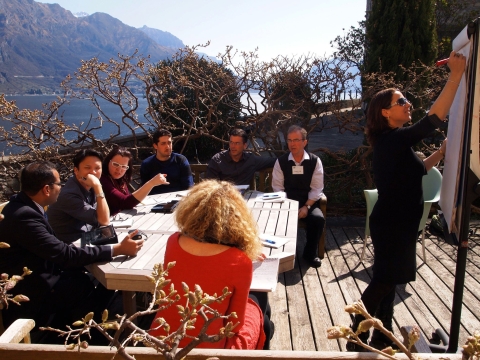
Journalists working on the mission statement of the International Association of Religion Journalists at the Bellagio Conference Center in Italy.
Nestled in the inspirational scenery of the Bellagio Conference Center on Lake Como in Italy, more than 30 journalists from six continents crafted and launched last week the world’s first global association of journalists who cover religion and spirituality.
The journalists collaborated to write a mission statement for the International Association of Religion Journalists, outline bylaws and membership requirements, strategize on educational programs and a fundraising strategy, plan web resources and online partnerships, and elect leaders. Maria-Paz López, who covers religion for La Vanguardia newspaper in Barcelona, was elected chair of the steering committee and Rachael Kohn, who produces religion programs for the Australian Broadcasting Corporation, was elected vice chair. David Briggs, a longtime U.S. religion journalist who consults for ICFJ on religion training programs and who has dreamed of such an international association for 20 years, was appointed executive director of the association by acclamation.
“From this new association we can promote and build better standards for religion coverage worldwide,” López said. “This will help to build a network of journalists with similar standards of profession and skill. … Also, (it will help us) gain respect in front of other journalists who cover other issues, and who tend to look at religion coverage as a ‘ghetto.’ ”
Along with organizer and facilitator extraordinaire Lisa Ellis, I was proud to represent ICFJ at the gathering. It is the culmination of years of work we have done to help journalists around the world better cover a topic that is essential to the lives of billions of people but is also fraught with controversy and conflict. More than 400 journalists have asked to join the association.
The program that launched the association is funded by the U.S. State Department’s Bureau of Democracy, Human Rights and Labor, while the gathering in Italy was sponsored by the Rockefeller Foundation, which operates the Bellagio Center.
We couldn’t have been more welcomed by the Bellagio staff, especially the delightful coordinator of the conference center, Nadia Gilardoni. And needless to say, we were thrilled to hold our breakout sessions sitting around tables overlooking the mountain-ringed lake, with views of a quaint fishing port a few hundred yards away and villages across the lake with Romanesque church towers dominating their skylines. (We did get to see those a little closer up on a two-hour boat tour on the last of our 3½ days at Bellagio.)
The participants represented 23 countries and many different cultural and religious backgrounds, and the atmosphere was always collegial and warm, even when we were discussing difficult topics, such as how to ensure that the board is diverse and representative of countries and cultures often in conflict.
Ruth Eglash of The Jerusalem Post and Hani Hazaimeh of The Jordan Times set an inspiring example when they talked about their two years of collaboration despite personal differences over Arab and Israeli policies and sometimes virulent accusations of treason by fellow journalists and others in their countries. Believing that responsible reporting can help assuage the tensions between their countries (despite a longstanding peace treaty), Eglash and Hazaimeh began collaborating on stories at a 2010 ICFJ conference in Alexandria, Egypt. Their example inspired others at the conference to look for opportunities for cross-border collaborations, which can be funded by ICFJ’s programs.
The participants also learned about the vast resources available from the Association of Religion Data Archives (ARDA) from Chris Bader, a professor at Chapman University in California. ARDA, ICFJ’s partner on the current religion program, gathers demographic and survey information about religion on countries around the world.
The group’s final act was to elect a steering committee. Besides López and Kohn, committee members are Eglash (secretary), Hazaimeh (treasurer), Endy Bayuni of Indonesia, Pedro Brieger of Argentina, Yazeed Kamaldien of South Africa, and Doug Todd of Canada. As executive director, Briggs also serves on the steering committee. The rest of the participants then signed up for working groups that will continue the progress begun at Bellagio on issues as varied as promoting the association globally, launching contests to recognize outstanding religion reporting and building a website with resources for members and others who cover religion.
Kohn says the association can help journalists around the world promote understanding that can assuage conflicts.
“When you look around the world today so many of the conflicts have a religious factor,” she said. “Religion journalists have a role in not really defusing the conflicts – because the conflicts are real – but the most important role they have is clarifying the issues, being fair in their representation of them and the individuals involved, most importantly not using … media to inflame the conflict.”
The association, she said, “can enhance understanding, it can foster relations between traditions, between religious groups. … Being together here, we realize that we belong to a community of people who care enough about these issues to want to report on them fairly and ethically.”
ICFJ will continue to be here to support this new organization as it grows beyond the founding group at Bellagio and becomes a force for improving coverage of one of the most important – and neglected – issues in our world.